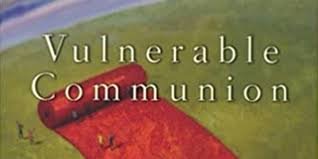In the post-resurrection story Luke tells, Jesus does two things to dispel the skepticism of his disciples, and each speaks powerfully to the kind of witness he calls us to bear to the world. First, Jesus shows his friends his hands and feet. It’s easy to gloss over this detail, but again, consider its strangeness. His hands and feet bear unmistakable signs of his crucifixion, his defeat, and his vulnerability. They’re not mended. His are fresh wounds, still raw and gaping. In her book, The Disabled God: Toward a Liberatory Theology of Disability, theologian Nancy Eiesland warns us not to take lightly the fact that Jesus came back to life with his body visibly broken: “The foundation of Christian theology is the resurrection of Jesus. Yet seldom is the resurrected Christ recognized as a deity whose hands, feet, and side bear the marks of profound physical impairment.” “In presenting his impaired body,” she continues, “the resurrected Jesus is revealed as the disabled God.” His injuries remain an essential part of his resurrected identity, neither a divine punishment nor an opportunity for further healing.
What would it be like for us to follow in the footsteps of a disabled God? What would it be like to lead with our scars, instead of enslaving ourselves to society’s expectations of piety and prettiness? Jesus proved that he was alive and approachable by risking real engagement. Real presence. As in: "Here is how you can recognize me. By my hands and my feet. See? I have scars. I have baggage. I have history. I am alive to pain, just as you are. I am not immune; I am real.”
The second thing Jesus does in this week’s Gospel reading is as unlikely as the first. He expresses hunger. “Have you got anything to eat?” he asks his bewildered disciples, and when they hand him a piece of broiled fish, he eats it in their presence. As Jesus eats, the disciples lose enough of their fear to draw close and actually listen to what he’s saying, and their receptivity allows Jesus to “open their minds to understand.” By the end of the encounter, they are no longer frightened — they are “witnesses of these things,” emboldened for life and ministry. Simply by expressing hunger, inviting hospitality, and accepting nourishment, Jesus turns a meal into communion. Perhaps the necessary way in which to read Jesus’s question (“Have you got anything to eat?”) is as a gentle reminder. In their fear and confusion, the disciples forgot the most basic rules of hospitality. Instead of offering Jesus food, water, shelter, or comfort, they pulled away, keeping themselves aloof because they were suspicious and afraid. So Jesus reminded them of their most fundamental calling — by leading with vulnerability: “Friends, I’m hungry. Would you please feed me?”
Do we need Jesus's gentle reminder as urgently as his disciples did? What if pushing past fear — fear of the stranger, fear of our inadequate culinary skills, fear of our messy kitchens, fear of wasting time or money, fear of experiencing rejection or failure, fear of not having enough left over for ourselves — is the best way to reveal Jesus to the world? What if practicing hospitality is practicing resurrection? What if more is at stake in a piece of fish (or a cup of tea, or a loaf of bread) than we have yet imagined? When the disciples fed Jesus, he fed them in return. When they chose generosity over suspicion, their eyes were opened, death fled the room, and the resurrected Jesus came alive in them. Belief didn't come first. Food did.
Scarred and hungry. This is our God. This is resurrection. This is the Word made Flesh. May we be witnesses of these things.
I have shared with you before my favorite prayer (Living Puzzles), written by theologian Stanley Hauerwas: ALL PRAISE TO YOU, living God, who Spirits your church into being, making us members one of another. It is a mystery that we are your body. But we praise you for it, for otherwise we would be so alone – condemned to live alone, to die alone. But you have given us one another in all shapes and sizes. We do not fit together all that well, but we pray that the puzzles of our lives may please you and entertain you, so that in the end we add up to be your kin-dom. Help us to live with the confidence of that kin-dom, in the light of your Son’s resurrection, so that when all is said and done, this may be said: “They were a strange lot, but look how they loved one another.”AMEN.

